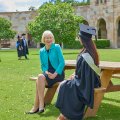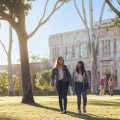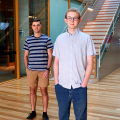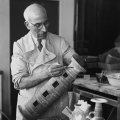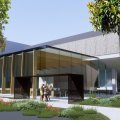THE technological revolution has flipped the role of teacher on its head, according to Professor Robert J Beichner.
“It’s sometimes called the inverted classroom because things that once happened in the classroom – content delivery – typically now happen outside, and things that once happened outside — like doing homework that involves very difficult problems — now happen in the classroom,” he said.
Professor Beichner will deliver Teaching & Learning Week keynote address in Brisbane on Monday. This year, he was awarded the McGraw Prize in Education, the United States’ top teaching prize, which is sometimes referred to as “the Nobel of education”.
“Students now have lots of information easily available, and this means they really don’t need teachers to deliver most of the content,” he said.
“If they are guided to the right places they can gather the content themselves. That style of learning actually is a better fit to how they have been living their lives — rather than sitting and listening to someone talking at them.”
Professor Beichner said this freed up valuable classroom time, allowing students to focus on applying content in class and working through the most difficult aspects with the support of their teachers and peers.
But he said students needed to be constantly reminded to check the veracity of information.
“This generation has grown up being used to having information at their fingertips,” he said. “They are not so used to checking to see if it is valid – that’s a skill they need to learn.”
Not all teachers had been able to easily make the transition to the new style of teaching in the technological era, Professor Beichner said.
“It does require a philosophical shift about what you think should be going on in the classroom, and that’s easier for some people than others,” he said.
“It requires teachers to have a really good knowledge of the content, because students will be asking more difficult questions than ever before.
“The ability to think on your feet and actually model how an expert solves something they don’t know the answer to — there’s a lot more opportunity for that style of teaching.
“It’s much less scripted than a lecture.”
Professor Beichner said teachers in the technological age needed to be more empathetic than previously.
“They need to be able to see things from students’ points of view, and they need to be able to present and work with students to take advantage of different learning preferences,” he said.
“Most people learn things in a very sequential sort of way, but there are some students who learn in a global sense. The teaching requirements are quite different for that and the possibilities for the students are very different.
“People who are global thinkers might have a harder time getting through a traditional educational experience, but once they understand the material they can make jumps from idea to idea that more sequential learners really can’t do. They tend to think quite differently.”
Mobile phones were changing the educational experience, and were making students quite different to their past counterparts, Professor Beichner said.
“They use telephones for all kinds of things besides just talking — in fact that seems to be a minor usage of them,” he said.
“It’s changed the way communication is done. It facilitates relationships in one sense – it’s easier to maintain relationships with people now, but it might be more difficult to have in-depth relationships.
“The big advantage of a ‘brick-and-mortar’ institution is that there are people there, you have live face-to-face, real time conversations with people instead of something over the web.
“And even though students are very facile at electronic social networking, Facebook and things like that, it hasn’t replaced the need for parties. So there is something about the way people’s brains are wired, that we need real human face-to-face contact.
“That’s something we as educators can use and that’s a real advantage that ‘brick-and-mortar’ institutions have that students cannot get on line. “
Dr Beichner, a physics teacher at North Carolina State University, was last year named 2010 USA Undergraduate Science Teacher of the Year. In 2009, he was Professor of the Year at NCSU. He is renowned for his work in small group learning processes as applied to large classes.
The McGraw Prize puts him among illustrious company: previous winners include two US federal secretaries of education, former first lady Barbara Bush and Christopher Cerf, one of the founders of Sesame Street.
He is visiting UQ for Teaching & Learning Week, and will speak on Monday at a ceremony to announce UQ’s prestigious Teaching & Learning Excellence Awards. Five UQ teachers — and one team — are due to receive awards this year.
Media: Fiona Cameron, UQ Communications, ph +61 7 3346 7086

